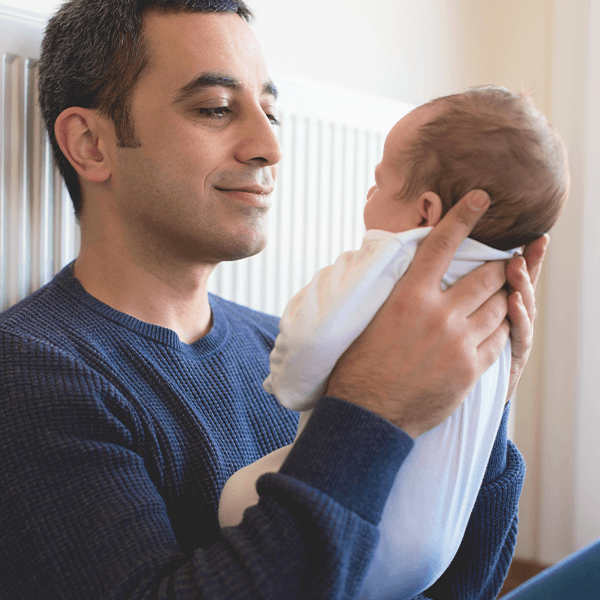One in five Australian men are fathers. That’s five million men who have been on the journey to parenthood ahead you.
If you’re thinking about having a baby, there may be lots of different things running through your mind.
You might be feeling excited about the prospect of welcoming a new member to the family, or you may feel nervous, thinking about your financial future or how your relationship with your partner may change.
From the get-go, it’s important to know that there is no rule book on how you should feel when you’re thinking about becoming a dad, but there are practical things you can start thinking about before taking this big step.
7 things to consider before having a baby
Maintaining a healthy lifestyle while trying for a baby is just as important for dads as it is for mums
Your current health status and overall lifestyle choices make a significant impact on your fertility.
This is because things like your weight, diet, level of exercise, alcohol consumption, whether or not you smoke cigarettes or use recreational drugs affects the quality of your sperm.
Your health at the time of conception also affects the future health of your baby.
For about half of the couples having trouble getting pregnant, the male partner is the contributing factor, so it’s key to look at ways that you can either improve your health or maintain healthy habits at the time of conception.
Start by evaluating your diet and how much you exercise. If there is wiggle room to eat more whole foods and exercise more often, start implementing these healthy habits.
If you are a regular drinker, identify where you could cut down. If you smoke or take drugs, now is the time to seriously consider kicking both of these harmful habits.
Try not to make the sex part stressful
Timing intercourse so that you’re only doing it during your partner’s fertile period is not essential but regular sex is!
You should be having sex during your partner’s fertile period but try not to plan everything out too much or it could end up being a source of stress for both you and your partner.
Having regular sex, as opposed to strictly scheduled sex during the ovulation period, has been shown to work effectively according to a paper titled Optimized natural fertility: a committee opinion.
Find time to do the things you enjoy ahead of parenthood
Something that is often overlooked by fathers-to-be is the real impact that having a baby will have on their lives. Having a baby is an incredibly busy time which means that your ‘you time’ will dramatically decrease.
This is a common symptom of new parenthood and is very normal, however, now is the time to make sure that you build up a bank of ‘you time’ so you’re well-equipped mentally and physically for this change.
The COVID-19 pandemic means that going to the cinema, concerts, restaurants and bars may no longer be on the cards but that doesn’t mean that you can’t do the things that you’ll have less time for once you become a dad.
So now is the time to start working on your pre-parenthood bucket list. That might mean more duvet days, taking up running, having beers with your mates online, or simply taking more time to look after yourself.
Set up a nest with your partner
Setting up a nest with your partner is a great way to bond and connect before two become three (or more)!
In the later stages of pregnancy, some women may start ‘nesting’.
Nesting describes a process that often happens during the later stages of pregnancy in which the mum-to-be begins to prepare for the arrival of the baby by cleaning and organising the home (or nest).
The nesting instinct is often strongest in the later stages of pregnancy.
Nesting is a natural urge that many mums-to-be have as it helps them to feel more in control of their environment — it’s a key part of preparing for birth.
While nesting is often associated with the later stages of pregnancy, there’s no reason why you can’t start planning now. Setting up a nest with your partner is a great way to bond in the earlier days of this journey, you can start by choosing which rooms in the home will be for your child(ren).
You might consider setting up a Pinterest board and thinking about how you’ll decorate the room.
Pre-pregnancy nesting helps to pave the way for more conversations about the future, such as how you’d both like to carry the load of parenthood, how having a baby affect your job(s), what baby names you like and how you visualise parenthood on the whole.
The earlier you have these conversations, the less surprises there will be down the line.
Be ready to support your partner, but don’t forget about yourself
Get ready and feel prepared to support your partner but make sure that you’re supporting yourself too. The safety protocols on aeroplanes which tell you to put on your mask before putting on your loved one’s mask applies here!
It’s important to get ready to support your partner. They are about to go through one of the most intense physical experiences of their lives and they’ll need all hands on deck in an emotional and practical way.
You will be better prepared to offer your support if you are making sure that you have what you need too.
Oftentimes, fathers may feel that they are extras on set in consultations with doctors, in the delivery room and after the birth. Men should feel that they are equal partners throughout the process.
Communication is key. Ask your partner what they need and share some of the things that will help you to be there for them.
Prepare for joy but accept some anxiety too
Having a baby can be an exciting time but there may also be some anxiety.
If you’re feeling a mixture of emotions, know that you’re definitely not the first dad-to-be who has felt excited with equal measures of anxiety and stress.
1 in 10 men experience depression and/or anxiety before or soon after birth of a child and 1 in 20 fathers experience depression while their partner is pregnant.
While there are fewer conversations happening around postpartum depression in men, and even fewer around the negative emotions that the path to fatherhood can bring up, there are resources out there to support men.
PANDA is a fantastic resource if you‘re hoping to do some more research around negative mental health as it relates to men. If you’re feeling stressed or worried, have a conversation with your partner or a loved one you can trust about how you’re feeling.
If anxiety or a low mood is persisting, and persist for three weeks or more, consider speaking with a healthcare professional, they’ll be the best person to equip you with a proactive approach to dealing with how you’re feeling.
Know that there is no ‘right’ way to have a baby
There is no ‘right’ way to have a baby. There is so much information out there that exists to help new parents-to-be, but it can be overwhelming and place pressure on you to be ‘perfect’.
Realise that there’s no such thing as perfect, everyone can only ever do their best.
The journey to parenthood will be a huge learning experience for both you and your partner. It will be a time of learning how to care for another person but also how to care for yourself.
Watch this video to learn more about how your sperm health affects your chances of having a baby:












